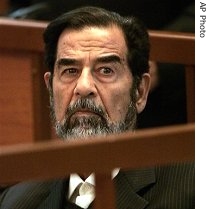-
(单词翻译:双击或拖选)
By Benjamin Sand
Irbil, Iraq
04 November 2006
 Saddam Hussein in court, Sept. 25, 2006 |
||
-----
Military leaves have been canceled and Iraqi troops are on high alert.
A week ago, Saddam Hussein's defense2 lawyer warned that a guilty verdict in the lengthy3 trial could spark violence throughout the Middle East.
Former Iraqi President Saddam and seven co-defendants are being tried for allegedly ordering the murder in 1982 of nearly 150 people in the Shi'ite town of Dujail, north of Baghdad. The killings4 came after an attempt on Saddam's life.
The court in Baghdad has been hearing evidence in the case for 10 months. If convicted, the ousted5 Iraqi dictator could face the death penalty.
Whatever the verdict, many Iraqis say the trial has already stripped Saddam of his once almost mystical hold over the country.
"It's gone, totally gone," says an Iraqi. "We don't fear of him anymore, we don't fear. He don't have power anymore, he don't have his people who pray for him, not anymore. All this [is] gone, he's nothing, only a normal person now."
One possible measure of Saddam's diminished stature6 is the fact that public interest in the trial has appeared to wane7 considerably8.
The proceedings9 are shown live on national television, but what with delays in court, and a surge in sectarian violence across much of the country distracting their attention, many people say they stopped watching months ago.
Twenty-nine-year-old Ali Hussein, an outspoken10 critic of Saddam, recently left Baghdad for the relative safety of the Kurdistan region in Northern Iraq.
He says the trial has taken a back seat to the struggle of many families here simply to survive the expanding violence.
"The most important thing in Iraq is how people can live safe and can we stop [the killing]," he said. "I don't care what's going to happen to Saddam Hussein. If he's going to be killed or not, if he's going to jail or not, what I care about is my family, my work in Iraq."
Saddam is being tried in two separate war crimes cases at the same time. In the second case, he is accused of genocide, stemming from the so-called Anfal campaign in 1988 against the Kurds of Northern Iraq.
A verdict in that second trial is not expected until sometime next year. However, if Saddam is convicted and condemned11 in the Dujail case, many Iraqi officials, including Prime Minister Nouri al-Maliki, are pushing for him to be executed quickly, even if the Anfal trial is still in progress.
But legal experts here say such quick action remains12 highly unlikely. If the first court does impose the death penalty in the Dujail case, the sentence would automatically be appealed to a nine-member appellate court. A final decision there could take at least several months.
 收听单词发音
收听单词发音
1
brace

|
|
| n. 支柱,曲柄,大括号; v. 绷紧,顶住,(为困难或坏事)做准备 | |
参考例句: |
|
|
|
2
defense

|
|
| n.防御,保卫;[pl.]防务工事;辩护,答辩 | |
参考例句: |
|
|
|
3
lengthy

|
|
| adj.漫长的,冗长的 | |
参考例句: |
|
|
|
4
killings

|
|
| 谋杀( killing的名词复数 ); 突然发大财,暴发 | |
参考例句: |
|
|
|
5
ousted

|
|
| 驱逐( oust的过去式和过去分词 ); 革职; 罢黜; 剥夺 | |
参考例句: |
|
|
|
6
stature

|
|
| n.(高度)水平,(高度)境界,身高,身材 | |
参考例句: |
|
|
|
7
wane

|
|
| n.衰微,亏缺,变弱;v.变小,亏缺,呈下弦 | |
参考例句: |
|
|
|
8
considerably

|
|
| adv.极大地;相当大地;在很大程度上 | |
参考例句: |
|
|
|
9
proceedings

|
|
| n.进程,过程,议程;诉讼(程序);公报 | |
参考例句: |
|
|
|
10
outspoken

|
|
| adj.直言无讳的,坦率的,坦白无隐的 | |
参考例句: |
|
|
|
11
condemned

|
|
| adj. 被责难的, 被宣告有罪的 动词condemn的过去式和过去分词 | |
参考例句: |
|
|
|
12
remains

|
|
| n.剩余物,残留物;遗体,遗迹 | |
参考例句: |
|
|
|















